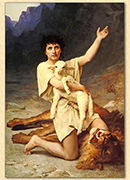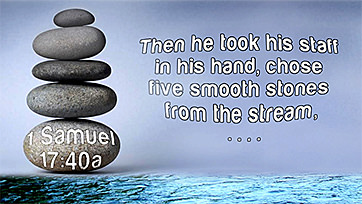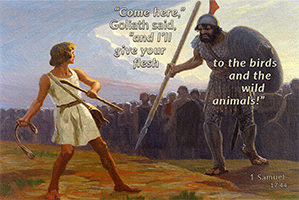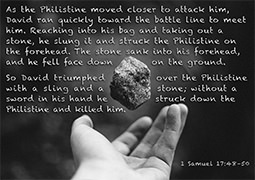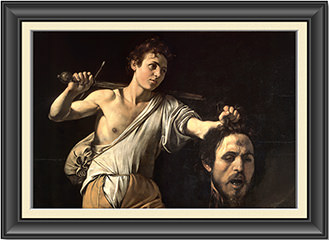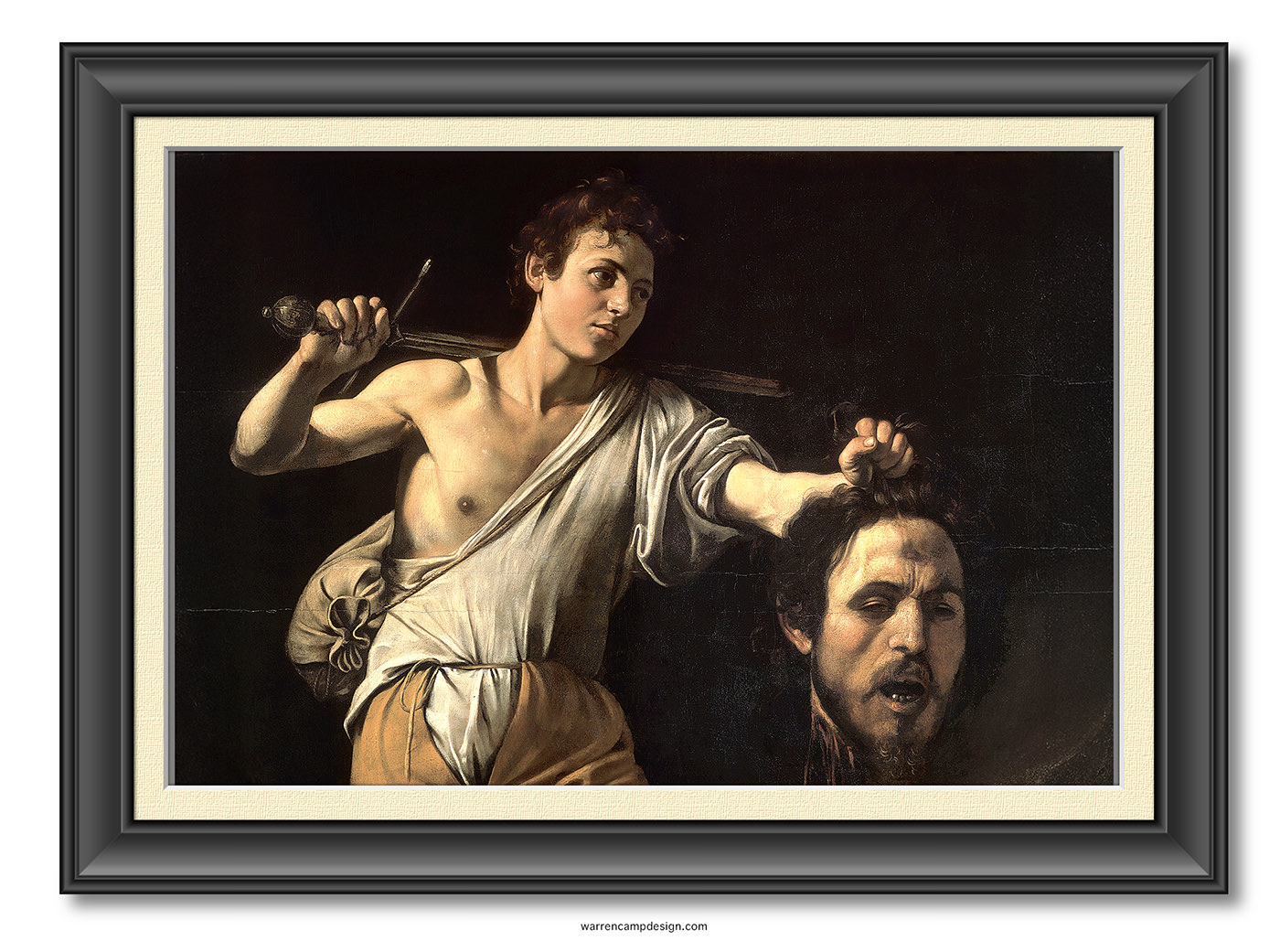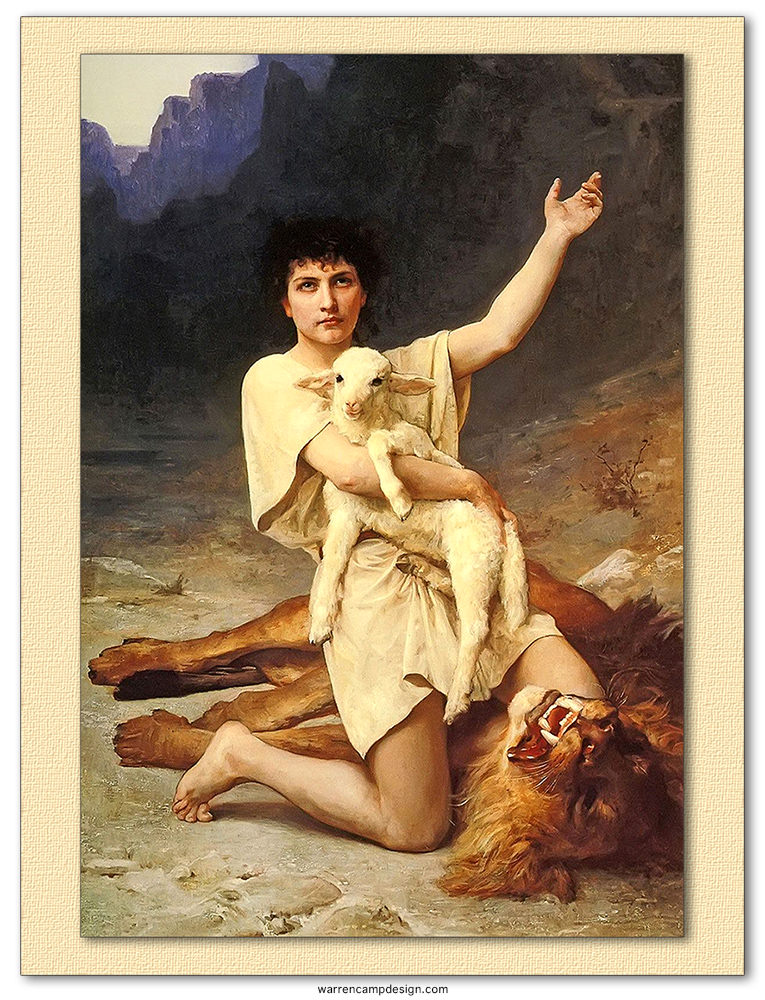1 Samuel 17:1–58 . . . Bible Study Summary with Videos and Questions
“David’s Strength: His Obedience”
Looking back at our previous discussions about Saul, remember that Israel’s king was to be a man who'd lead the nation in war. Chapter 17 of 1 Samuel paints a revealing portrait of Saul. During the confrontation with Goliath, it shows that Saul, along with all Israel, is paralyzed by fear and unable to confront the Philistine champion, despite being Israel’s king who was believed to be taller than any of his soldiers. Sadly, Saul’s response is marked by dismay and passivity; he offers rewards to anyone willing to fight Goliath but doesn’t step forward himself. This reflects a significant decline in his leadership and courage, especially compared to earlier times in his reign.
Herein, we'll see how Saul failed to live up to his kingly duty, and how David fulfilled his responsibilities as God’s newly-anointed king. Ironically, Saul was the champion of the Israelite soldiers, yet he wasn't to be found on the front lines of battle, but was looking on from a safe distance. When his soldiers needed him the most, he was filled with fear. No wonder his men were also fearful (vv. 11, 24).
[Note: Click the link to This Week’s Passage near the bottom of this page to read today’s Scripture.]
Dismayed and Terrified (17:1–11)
As we prepare to read and discuss the exciting story of David and Goliath, it's important to realize that only vv. 40–51 deal with the battle between David and the Philistine giant; nearly 80 percent of this chapter prepares us for this conflict or follows up on the victory over Goliath. By focusing only on “David and Goliath,” we might neglect the greatest portion of the passage and its emphasis.
4A champion named Goliath, who was from Gath, came out of the Philistine camp. His height was six cubits and a span. 5He had a bronze helmet on his head and wore a coat of scale armor of bronze weighing five thousand shekels; 6on his legs he wore bronze greaves, and a bronze javelin was slung on his back. 7His spear shaft was like a weaver’s rod, and its iron point weighed six hundred shekels. His shield bearer went ahead of him (1 Sam. 17:4–7).
Were the Israelites, including Saul, terrorized by Goliath (see vv. 11, 24, 32)? They shouldn't have been. Such fear would have been brought about by a lack of faith. Instead, they should have been asking, “Only one giant. . .?” Clearly, Israel lacked requisite faith because it required godly leadership. Then the giant Philistine warrior said, “This day I defy the armies of Israel! Give me a man and let us fight each other.” Saul and all the Israelites were dismayed and terrified.
Goliath was apparently 9 feet, 9 inches tall. The huge size of his weaponry supports this conclusion: Five thousand shekels' weighed 125 pounds (v. 5); his spearhead weighed 15 pounds (v. 7), which is about the weight of a standard shot-put. This is an unusually long description of an Old Testament individual. The writer evidently wanted to impress Goliath's awesome power and apparent invulnerability on readers so we'd appreciate David's great courage and faith.
The Philistines proposed a battle in which two representative champions — Israel and Philistia — would duel it out, a not uncommon method of limiting war in the ancient world (cf. 2 Samuel 2). However, the Israelites had no one who could compete with Goliath physically. That was the primary worry that Saul and his generals saw. Since Saul was the tallest of Israelites and was their king, he'd have been the natural choice to become Goliath's opponent. However, as was revealed previously (14:1–2), Saul had intentionally remained in the background when he should have been leading his people.
Checking in on His Brothers in Battle (vv. 12–25)
For forty days the Philistine came forward every morning and evening and took his stand (1 Sam. 17:14).
The battle site was 15 miles due west of David's hometown, Bethlehem, which Old Testament writers sometimes called "Ephrathah" (v. 12). David journeyed to the battle site to bring food (apparently a variety of cheeseburgers? [v. 18]) to his brothers and their fellow soldiers and to collect news to bring back to Jesse his father. The battle had been a standoff for 40 days (v. 16). Biblically, the number 40 often represents a testing period (cf. the Israelites' testing in the wilderness for 40 years, Jesus' testing for 40 days, etc.). This was another test for Israel. Would the nation trust in the arm of the flesh or in Father God?
Over that forty-day period, while the Israelites seem to have become increasingly fearful and reluctant to oblige Goliath, Goliath apparently become bolder and bolder. Twice a day (morning and evening) he approached the Israelite front lines, challenging any Israelite warrior who had the courage to come out and fight him. The Israelites didn't take Goliath’s challenge lightly; they were frightened; no one was willing to accept giant Goliath’s challenge. David is about to present himself.
When we first encountered David in last week's study, he was tending his father’s sheep, a job on which his older brothers looked down upon (v. 28). His father didn’t even consider David important enough to be included at the big event with Samuel (16:11). But God saw David’s faithfulness in this seemingly unimportant task. Later, Saul heard of David’s skill as a musician and summoned him to the palace. As David played his harp out in the fields, he never dreamed that his musical gift would someday open the door for him to play before King Saul. But, when it did, David served well in this more important task (vv. 14–23).
Soon afterwards, the Israelites went to war with the Philistines. David’s older brothers joined Saul on the battlefield. But where was David? Back tending his father’s sheep again, and serving as errand boy for his father (vv. 14–15). When Jesse directed David to go find out about his brothers’ welfare, he carefully made provision for his shepherding responsibilities and obeyed his father (v. 20).
A Rope’s Obedient Strands (vv. 26–30)
Eventually, David got to the battlefront. He heard Goliath’s blasphemous challenge and began asking questions (v. 26). This threatened David’s oldest brother, Eliab, who put David down with a sarcastic question (v. 28). David easily could have responded: You coward! Why don’t you go out after Goliath? Instead, David held his tongue (vv. 29–30).
Individually, none of these accounts is noteworthy. Combined, they show how David, while still a teenager, was learning to obey God in those insignificant situations in which God placed him. Having already been anointed by the great prophet Samuel, he could have said, I’m not going back to those silly sheep. Get a servant to do it! Or, I’m not your errand boy! I’m the future king! But young David shone like a star! Obedience in small things may not seem important, but it’s like the small strands that are woven together to make a rope. We tend to sit around wishing that God would use us for some important task, like slaying Goliath, not realizing that it’s obedience in the small, everyday tasks that God sets before us that, when woven together, make a rope that enables us to bring down Goliath. The moral fiber that permits us to attack and defeat huge problems in life is made up of strands of obedience in small, moral choices that confront us daily: integrity, controlling wrong thoughts, guarding our speech, controlling anger, submitting to authority.
David: A Teen’s Qualification to Fight a Giant (vv. 31–40)
When David volunteered to be Israel's champion, Saul scoffed at him because he evaluated David's chances for success solely in physical terms, as usual. Interestingly, the Hebrew word na'ar translated "youth" (v. 33) usually describes an older teenager. Young David certainly had the physical strength needed to defeat two formidable beasts (v. 34). However, his confidence was based upon Goliath having set himself against the living God (v. 36). David viewed Goliath as just another predator who was threatening the safety of God's flock, Israel, and the reputation of Israel's God. He gave credit to God for allowing him to kill the lion and the bear (v. 37). Saul, on the other hand, again showed that he trusted in material things for his success by arming David as he had (v. 38). In the end, David preferred his simple sling weapon that he could handle best (v. 40).
The sling that David used wasn't what we know of today as a slingshot. It was an ancient offensive weapon that shepherds used to control their sheep. They usually made a sling out of a long, thin strip of leather with a pouch formed in its middle. Talented slingers could propel small objects hundreds of feet at very high speeds with great accuracy (cf. Judges 20:16). David beat Goliath, not with a warrior's weapon but with a shepherd's tool.
David: Victory through Faith (vv. 41–58)
For 40 days, no one dared to face the giant, including King Saul. Goliath disregarded David because the lad showed no battle scars; he wasn't a warrior at all, simply a fresh-faced boy (v. 42). David was outraged by Goliath's blasphemy against God and Israel. He volunteered to fight Goliath, battling him with only his shepherd's staff, a sling, and five smooth stones. Goliath assumed that he'd win because his physical power and armaments were superior. He trusted in his own abilities and weapons. As often happens, pride preceded his fall (Proverb 16:18). The clearest expression of David's faith in Yahweh can be seen in vv. 45–47; he viewed Yahweh as the commander of Israel's armies, a view of God that Saul never accepted but which made the difference between Saul's failure and David's success as the Lord's anointed (v. 45). He also saw God as the real deliverer of Israel (v. 46). Furthermore, David furthered God's reputation (v. 47), not his own glory, which so preoccupied Saul (Israel's Goliath).
God used a humble weapon to give his people a great victory in response to one person's faith. It's another example of God bringing blessing to and through a person who committed himself to simply believing and obeying God's Word (cf. 14:1). One small stone was all that God needed to accomplish what he'd planned. It was God's unseen hand that propelled and directed it. The stone that hit Goliath in the forehead evidently only knocked him out. David then approached the fallen giant, slew him with his own sword, and cut off the defeated enemy's head, which was very common in those days. He completed the execution of the giant, documenting Goliath's death to everyone present. Seeing Goliath destroyed, the Israelites chased the fleeing Philistines back to their hometowns. David took Goliath's head to Jerusalem as a war trophy, temporarily putting the giant's weapons in his own tent (v. 54) as memorials of God's great deliverance on that occasion.
The four closing verses focus on the question of whose son David was. Saul needed to know the name of David's father to deliver the prize that he'd promised Goliath's defeater (v. 25). David's victory that day in the valley of Elah made him a national hero and entitled him to the hand of the king's daughter in marriage; but it also evoked jealous feelings in Saul, indirectly setting in motion the events that fill the rest of 1 Samuel.
Hearty Review — Confronting Goliaths in Your Life
David’s short battle with Goliath was more than a fight between Israelites and Philistines. It was a defense of Yahweh’s name against those who doubted his supremacy. As David pointed out, the only way a boy with a sling could defeat a giant warrior like Goliath was by the Lord’s hand. And that’s exactly what happened.
In confronting Goliath, David showed real courage and faith. But we see that what drove him to face the giant was righteous indignation: “Who is this uncircumcised Philistine that he should defy the armies of the living God?” (v. 26). David believed that someone had to wipe away from Israel the reproach caused by Goliath’s insults. Since no one else would step forward, he volunteered to defend Yahweh’s name.
Modern audiences often read this story merely as a battle scene wherein an inexperienced underdog toppled an ancient superhero. We comfort ourselves that we'll probably never have to deal with such a scenario. But the real story is that David stood up for God. Given how our culture scoffs at both the Father and Jesus Christ, believers will certainly spend some time in David’s sandals. The question is whether we'll listen to our own flesh and silently remain in fear, or stand and represent God’s name in the way for which he’s called and equipped us.
You don’t need a theology degree to combat those who would mock God. Your “smooth stones from the stream” (v. 40) are the "truths from the Bible." No enemy can win an argument against Scripture. Whatever the outcome seems to be, the battle is the Lord’s. He gives victory to those who are faithful and hearty.
† Summary of 1 Samuel 17:1–58
1 Samuel 17:1–58 recounts the iconic story of David and Goliath, the dramatic confrontation that reveals God’s power through unlikely means. The Philistines and Israelites face off in the Valley of Elah, with the Philistine champion Goliath — a giant over nine feet tall — taunting Israel and challenging any man to single combat (vv. 1–11). Saul and all Israel are terrified, but young David, the youngest son of Jesse who has come to bring food to his brothers, hears Goliath’s defiance and is stirred to action (vv. 12–26).
Despite his brothers’ skepticism and Saul’s doubts about his youth, David insists that God who delivered him from lions and bears will also deliver him from Goliath (vv. 28–37). Rejecting Saul’s armor, David approaches the giant with only his staff, sling, and five stones, declaring that the battle belongs to the Lord (vv. 38–47). David strikes Goliath in the forehead with a stone from his sling, killing him and cutting off his head. The Philistines flee, and Israel wins a decisive victory (vv. 48–54). Saul inquires about David’s identity after the battle, emphasizing how this remarkable act marks the rise of David in Israel (v. 55–58).
Key points with verse references:
• The Philistines challenge Israel with Goliath, whose taunts bring fear and disgrace to Saul and the army (vv. 1–11).
• Samuel anoints David, the youngest son, and the Spirit of the Lord comes powerfully upon him (vv. 8–13).
• The Spirit departs from Saul, and a troubling spirit from the Lord afflicts him (v. 14).
• Saul’s attendants recommend music to soothe him; David is chosen for his skill, reputation, and godly character (vv. 15–18).
• David enters Saul’s service as a musician and armor-bearer, bringing relief to Saul and finding favor in his eyes (vv. 19–23).
This Week's Passage
1 Samuel 17:1–58
New International Version (NIV) [View it in a different version by clicking here; also listen to chapter 17 narrated by Max McLean].
† Summary Video: “The First Book of Samuel”
† Watch this introductory video clip created by BibleProject on bibleproject.com.
- Q. 1 Which discouraging things did people say about David in this chapter?
- Q. 2 Did such opinions of David stop him from fighting Goliath? Who did David credit for his past victories?
- Q. 3 What giants are drawn up against you in battle?

